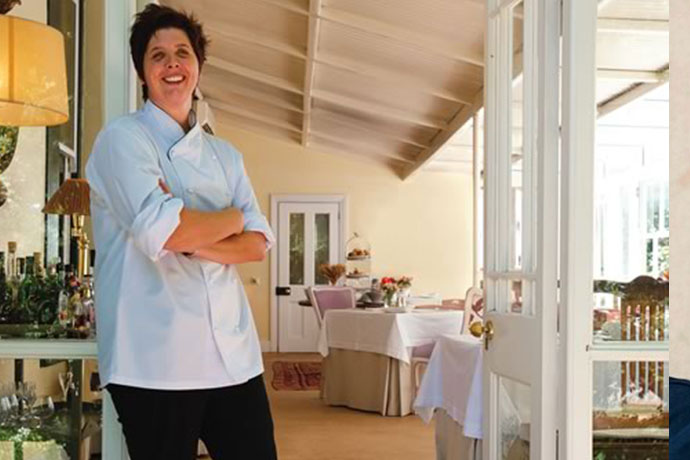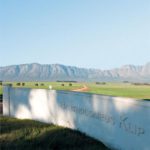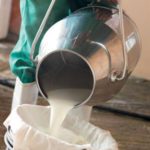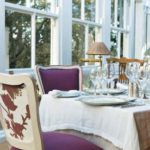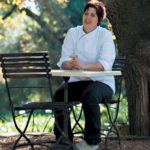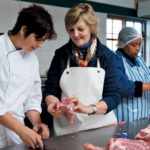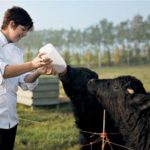Louise Gillett of Bartholomeus Klip believes in buying local, staying seasonal and cooking to please her own palate.
Richard Holmes
If you ever need evidence of the changing seasons, spend a little time on the road to Bo Hermon. It’s not far from the vineyards of Riebeek- Kasteel, and barely 80 minutes from the frenzied streets of Cape Town, but here, on this short strip of gravel, the fields mark the passage of time.
In summer, plumes of dust billow from the brown road that blends seamlessly into the fallow wheat fields. Come autumn, the first green shoots push their tips through the loamy soil and farmers ready themselves for lambing season.
Winter sees waving fields of green, snow-capped mountains, chimney smoke rising and bright fields of happy canola. It’s impossible to be in a bad mood when driving through fields of canola, don’t you think? And then spring, when the smell of warming earth rises and both humans and animals turn their faces to the long-lost sun.
Louise Gillett, gifted executive chef at Bartholomeus Klip, lives in the midst of these fields, and is inpired by them. I enter the beautifully restored Victorian guesthouse and a vintage silver tray of tea and home-baked chocolate biscuits (did she know they were my favourite?) magically appears as we sit down on the wide stoep.
“We always change our menu with the seasons,” says Louise. “In summer it’s a lighter menu and in winter we offer a hearty four-course dinner. “We have a small herb garden for things like basil, gooseberries and strawberries, and lettuce in spring.
Whatever is ripe in the garden ends up on the evening menu.” With the fertile Riebeek valley as her supermarket, Louise tries to buy everything locally, “from producers and suppliers right on our doorstep,” so we set off to visit two of her favourites. First up is Wayne Rademeyer, who swapped his high-stress job as an advocate for a herd of Indian water buffalo and a small cheesery in the pastures alongside the R44. The milking shed at Buffalo Ridge has heavy-duty stalls to handle the heavy beasts, but otherwise it’s a gentle, hands-on operation.
“We don’t pump the milk, as it breaks down the fats and affects the delicate flavour,” says Wayne. “All our buffalo are pasture-fed, and you can really taste the difference.” Louise nods in agreement, cutting another chunk from the small ball of beautifully elastic cheese, which Wayne says is not salted, because it absorbs enough salts from the brine made to his own secret recipe.
This is a family-run labour of love, not unlike Bartholomeus Klip, where Louise’s identical twin sister Lesley manages the guesthouse. “We each have our strengths,” says Louise. “Although I’m the oldest by two minutes, she’s definitely the organiser who will take charge. I’m not an angry chef, but when it’s busy she knows to stay out of the kitchen!” Family ties run deep in the Swartland, and nowhere more so than at Deli-Co on the outskirts of Riebeek-Kasteel.
With its baskets of biltong and fridges of meat, it looks like any other city butchery, except that outside the front doors are rolling pastures, bright and lush after good rains. “The Truters have been farming here for 120 years,” says Louise as we wander up the steps. “Their lamb is all free range, and I only use their grassfed beef. Ethically, I think it’s the right thing to do, and it also tastes better.” Louise’s philosophy is simple: you can’t go too far wrong by doing the right things for the right reasons.
“It’s important to know where your food comes from and the people you buy from. I want to buy local, and our guests like to know that we’re buying local. Our eggs are local and we buy our guavas from the farmer down the road. So I know where my produce comes from, and I know I’m helping to support local people, their farms and their workers.”
Being stuck out on a country farm, I wonder how she remains creative in the kitchen, and where she finds the inspiration to keep her hungry guests well fed, day in and day out.
“I change my mind every day,” she says, “and I only cook things that I like to eat. I’m not going to cook something just because it has a fancy name or preparation. That’s not why I cook. I’ve eaten at The Fat Duck and it was certainly an experience, but it wasn’t food. It’s nice to see it, but it’s not the kind of food I want to make. I prefer wholesome, no-frills food.
“There’s a bit of everything on the menu. There’s a strong French influence in the way the dishes are prepared, but there’s also a lot of Italian inspiration, as my mom is Italian. My grandmother was also a very good cook and she left folders full of vintage recipes that I’ve been playing with and making my own.”
A well-thumbed collection of cookery books provides ideas for the fresh produce in Louise’s kitchen, where the emphasis is on allowing ingredients to speak for themselves. “I think Gordon Ramsay’s books are great for both the novice and the professional. He takes fresh ingredients and makes them the focus of the dish. It’s not about turning it into foam or anything; it’s about the quality of ingredients. Locally, I’m inspired by chefs like Michael Broughton from Terroir in Stellenbosch. He’s right up there with the best chefs in the country, taking South African food to another level. I also love Judy Badenhorst. She has such a passion for food.”
Although Louise calls cooking dinner, “the most rewarding part of my day,” it’s Bartholomeus Klip’s legendary High Tea that is being laid out as I wander to my car. Is this something she values, I ask? “Absolutely,” says Louise. “Tea is something to look forward to at the end of the day. And besides, there’s nothing better than a fresh scone with strawberry jam… that’ll make anyone feel welcome!”
I felt welcome, and a warm country farewell sent me back on the road to Cape Town, passing through the acres of yellowing wheat. We may have lost the turning of seasons in the city, but in the peaceful fields surrounding Bartholomeus Klip, the passage of time is written in the furrows. And in the dishes on Louise’s table.
Learn from Louise
Louise Gillett holds regular cooking demonstrations and classes in the original farmhouse kitchen and takes students on trips to source fresh local produce for use in their own creations.
For more information on classes and Bartholomeus Klip guesthouse, call 082 322 1758 or 082 529 8539 or visit www.bartholomeusklip.com.
SOURCES
Bruce Tuck

